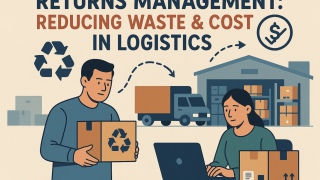When considering the best way to handle their physical assets and documents, businesses often face a critical decision: temporary vs. long-term storage solutions. This choice is more than just about space; it's about efficiency, cost, and strategic planning. A well-thought-out approach to storage solutions can significantly impact a company's operations, bottom line, and overall growth.
The Role of Storage Solutions in Business

In today's fast-paced business environment, organizations accumulate a vast amount of physical inventory, equipment, and records. From seasonal stock and trade show booths to archival documents and office furniture, managing these items effectively is a logistical challenge. This is where professional storage solutions come into play, offering a secure and organized way to manage these assets without cluttering valuable office or warehouse space.
Understanding Short-Term Storage Solutions
Short-term storage, often referred to as temporary storage, is a flexible option designed to meet immediate, fleeting needs. This type of solution is typically used for a few weeks to a few months.
Key Use Cases for Short-Term Storage:
-
Seasonal Inventory: Retail businesses often need extra space for holiday stock, and short-term storage provides a perfect solution to handle the seasonal influx of goods.
-
Office Relocation or Renovation: When moving to a new office or undergoing renovations, a business might need a temporary place to store furniture, equipment, and files to ensure a smooth transition.
-
Trade Shows and Events: Companies participating in events need a secure place to store their booths, displays, and promotional materials between events.
-
Merchandise Returns: Managing a high volume of returns can require temporary space until the items can be processed, resold, or disposed of.
-
Emergency Situations: Natural disasters or unexpected events can force businesses to temporarily move their operations, and a short-term storage unit provides a quick, secure location for their assets.
Advantages of Short-Term Storage:
-
Flexibility: Businesses can rent space on a month-to-month basis, making it easy to scale up or down as needed.
-
Cost-Effective for Temporary Needs: Paying for a short-term solution is much cheaper than leasing a long-term warehouse for a brief period.
-
Quick Access: These solutions are often located in convenient, accessible areas, allowing for easy retrieval of items.
Disadvantages of Short-Term Storage:
-
Higher Monthly Rates: While cheaper in the short run, the per-month cost can be higher compared to a long-term contract.
-
Lack of Integration: Short-term solutions may not offer advanced inventory management systems, making it more challenging for businesses with complex logistical needs.
Diving into Long-Term Storage Solutions
Long-term storage solutions are for businesses with ongoing, persistent storage needs. This type of arrangement is typically for a year or more and is ideal for items that don’t require frequent access.
Key Use Cases for Long-Term Storage:
-
Archival Records: Many industries, such as legal and healthcare, are required by law to keep records for several years. Long-term storage provides a secure, climate-controlled environment for these critical documents.
-
Excess Inventory: Businesses with slow-moving stock or a large volume of non-perishable goods can use long-term storage to free up valuable on-site warehouse space.
-
Business Equipment and Tools: Construction companies, event planners, and other businesses with specialized equipment can use long-term storage to keep their assets safe and organized when not in use.
-
Historical Archives: Museums and heritage organizations can use long-term storage to preserve artifacts and documents that are not currently on display.
-
Fleet Storage: Companies with a fleet of vehicles or equipment might use long-term storage for vehicles that are not in active use.
Advantages of Long-Term Storage:
-
Lower Monthly Costs: Long-term contracts often come with discounted rates, making them more economical over time.
-
Enhanced Security: Professional long-term storage facilities typically offer advanced security features, including 24/7 surveillance, climate control, and fire suppression systems, which are crucial for protecting valuable or sensitive items.
-
Strategic Planning: Integrating long-term storage into business operations allows for better space management and future planning, preventing the need for costly last-minute solutions.
Disadvantages of Long-Term Storage:
-
Less Flexibility: Breaking a long-term contract can be costly, so businesses must be certain of their needs before committing.
-
Potential for High Initial Investment: While monthly costs may be lower, the overall investment over a long period can be significant.
Making the Right Choice: Temporary vs. Long-Term
Choosing between temporary and long-term storage solutions requires a careful evaluation of a business's specific needs. Here are some key questions to consider:
-
What is the duration of your storage need? If you need space for a few weeks or months, a short-term solution is likely the best choice. If you anticipate needing the space for a year or more, a long-term contract will be more cost-effective.
-
How often will you need to access your stored items? If you need frequent access to your inventory or equipment, a short-term solution with easy access might be preferable. For items that are stored for archival or non-operational purposes, a long-term facility with less frequent access is ideal.
-
What is the value and sensitivity of the items? High-value equipment, sensitive documents, or items that require specific climate conditions (e.g., electronics, artwork) are better suited for the enhanced security and climate control of a long-term facility.
-
What is your budget? While a long-term solution can be cheaper per month, a short-term solution might be the only viable option for a limited budget and a temporary need.
The Rise of Hybrid Storage Solutions
Some businesses are finding that a combination of both temporary and long-term storage solutions is the most effective approach. For example, a retail business might use a long-term solution for its core inventory and archives while utilizing a short-term unit to handle seasonal overstock or returns. This hybrid model offers the best of both worlds, combining the flexibility of short-term options with the cost-effectiveness and security of long-term storage.
Conclusion
Whether a business opts for a temporary or long-term storage solution, the decision should be driven by a strategic assessment of its current and future needs. From managing seasonal inventory to preserving critical documents, effective storage solutions are a cornerstone of modern business management. By carefully considering the duration, access requirements, and nature of the items to be stored, businesses can make an informed choice that supports their operational efficiency, protects their assets, and contributes to their long-term success.
_0x70_d59.png)



